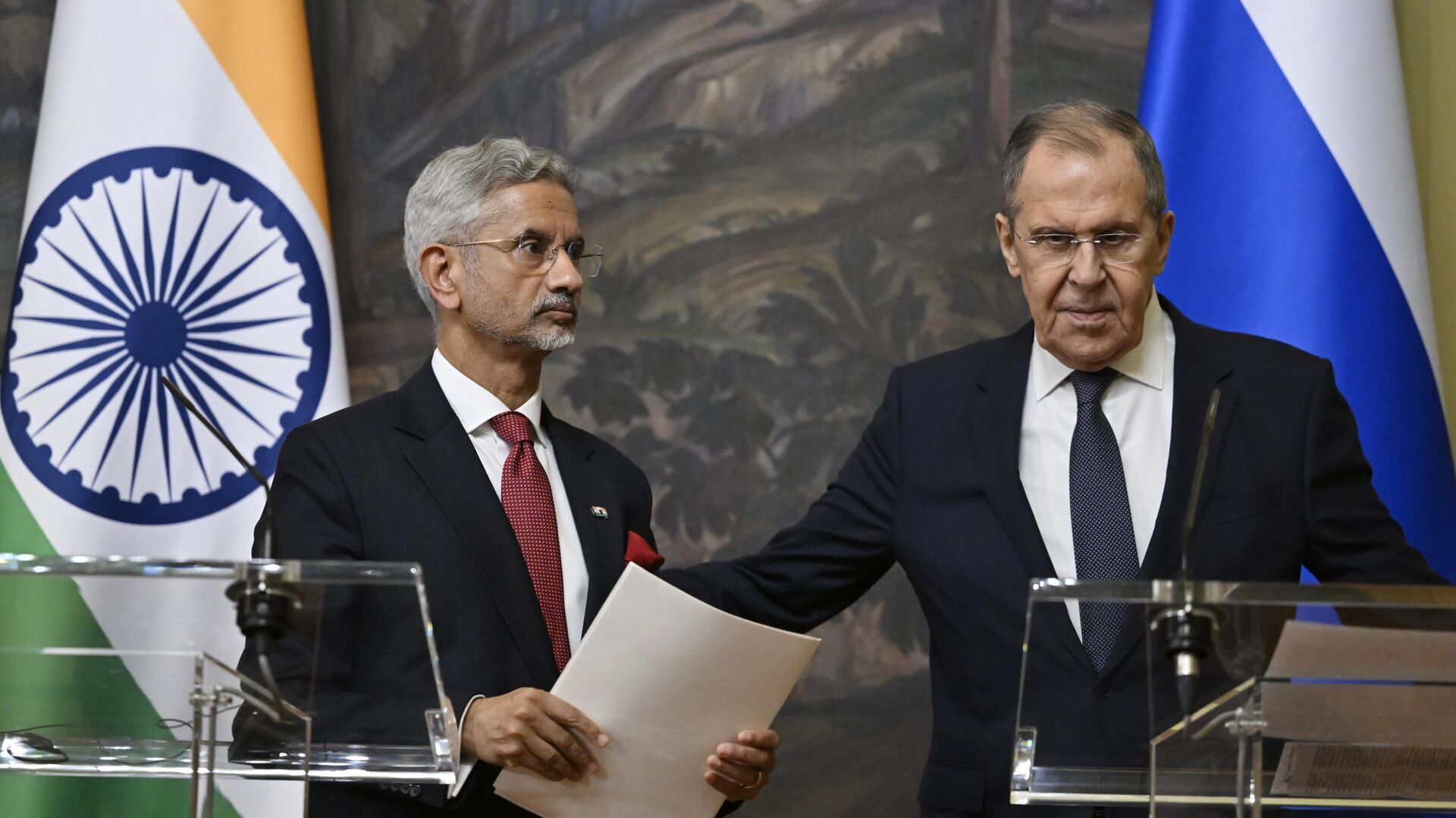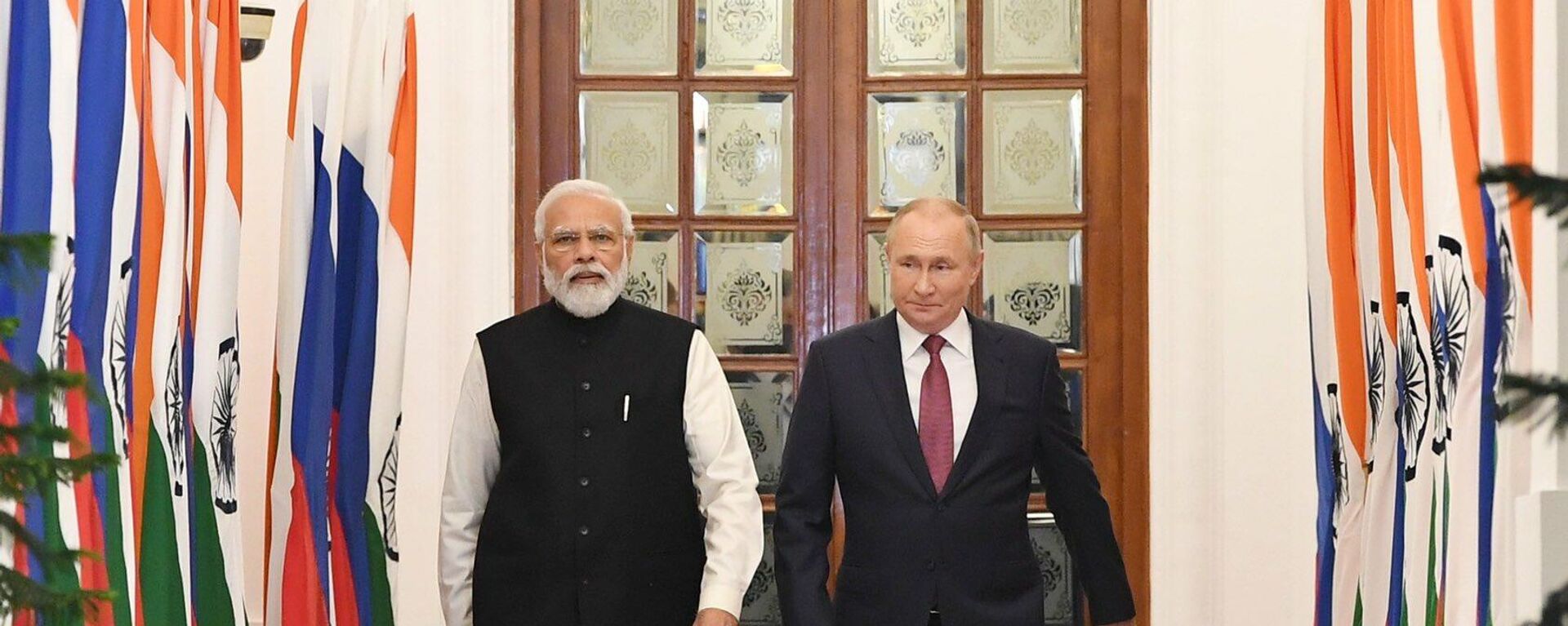https://sputniknews.in/20240515/jaishankar-explains-russias-important-role-in-indias-viksit-bharat-goal-7368474.html
Jaishankar Explains Russia’s Important Role in India's 'Viksit Bharat' Goal
Jaishankar Explains Russia’s Important Role in India's 'Viksit Bharat' Goal
Sputnik India
Indian External Affairs Minister (EAM) S Jaishankar has said Russia ranked "very high" in the list of resource-rich countries which would play an instrumental role in achieving the goal of 'Viksit Bharat'.
2024-05-15T13:31+0530
2024-05-15T13:31+0530
2024-05-15T13:31+0530
indo-russian relations
s. jaishankar
russia
india
kolkata
oil exporters
global oil production
russian oil price cap
oil supplies
russian oil
https://cdn1.img.sputniknews.in/img/07e8/05/0f/7370747_0:161:3071:1888_1920x0_80_0_0_a897bbd426e715258ae37431298b6930.jpg
Indian External Affairs Minister (EAM) S Jaishankar has said Russia ranked very high in the list of resource-rich countries which would play an instrumental role in achieving the goal of 'Viksit Bharat', or the ongoing transition of India from a developing nation to a developed country by 2047.He stated that Russia ranked "very, very high" on the list of countries which would support India's economic growth.'India's Always had a Positive Relationship with Russia'Jaishankar stated that besides the economic logic behind India-Russia relations, the history of ties between the two nations and geopolitics were two other factors behind strong ties.Jaishankar explained that the second factor was geopolitics.Since last year, Russia has emerged as a top source of crude for India, accounting for around 30-40 percent of its overall oil requirements. Two-way trade between New Delhi and Moscow touched a record high of $65 billion in 2023-24, propelling Russia to become among India's top five trading partners.Jaishankar Takes Aim at Western DemocraciesSpeaking at the same event, Jaishankar criticised the West for lecturing India on how to conduct elections, amid interference attempts by countries such as the US and Germany in the Lok Sabha polls.He noted that the western media, on the other hand, had "openly endorsed candidates and political parties".
https://sputniknews.in/20240416/bjp-manifesto-decoding-russias-role-in-bharat-first-foreign-policy-7147927.html
russia
india
kolkata
ukraine
europe
eurasia
china
Sputnik India
feedback.hindi@sputniknews.com
+74956456601
MIA „Rossiya Segodnya“
2024
Dhairya Maheshwari
https://cdn1.img.sputniknews.in/img/07e6/0c/13/138962_0:0:641:640_100x100_80_0_0_2cb44360dbcdf6d84bf4b299cd045917.jpg
Dhairya Maheshwari
https://cdn1.img.sputniknews.in/img/07e6/0c/13/138962_0:0:641:640_100x100_80_0_0_2cb44360dbcdf6d84bf4b299cd045917.jpg
News
en_IN
Sputnik India
feedback.hindi@sputniknews.com
+74956456601
MIA „Rossiya Segodnya“
Sputnik India
feedback.hindi@sputniknews.com
+74956456601
MIA „Rossiya Segodnya“
Dhairya Maheshwari
https://cdn1.img.sputniknews.in/img/07e6/0c/13/138962_0:0:641:640_100x100_80_0_0_2cb44360dbcdf6d84bf4b299cd045917.jpg
russian oil exports, russia india relations, modi putin summit, russia brics summit, russian coal exports, russian fertilizer exports, western sanctions on russia, russia ukraine war update, russia ukraine war news, russia india ties, western media on india, us interference in indian election, lok sabha election results, lok sabha news, modi news, modi speech
russian oil exports, russia india relations, modi putin summit, russia brics summit, russian coal exports, russian fertilizer exports, western sanctions on russia, russia ukraine war update, russia ukraine war news, russia india ties, western media on india, us interference in indian election, lok sabha election results, lok sabha news, modi news, modi speech
Jaishankar Explains Russia’s Important Role in India's 'Viksit Bharat' Goal
The top Indian diplomat spelled out three reasons behind strong India-Russia ties - history, geopolitics and economics.
Indian External Affairs Minister (EAM) S Jaishankar has said Russia ranked very high in the list of resource-rich countries which would play an instrumental role in achieving the goal of 'Viksit Bharat', or the ongoing transition of India from a developing nation to a developed country by 2047.
“The fact is that Russia is one of the biggest natural resources producers in the world,” Jaishankar told an event in Kolkata to mark the Bengali-language edition launch of his book 'Why Bharat Matters' on Tuesday evening.
“Given India’s economic requirements, you say Viksit Bharat (developed India). What does Viksit Bharat mean? We are saying at least for 25 years, probably for much more, for 25 years this country is going to grow at seven, eight or nine percent,” the top Indian diplomat stressed.
He stated that Russia ranked "very, very high" on the list of countries which would support India's economic growth.
“If I were to make, put the experience issue aside, forget that I am from a foreign policy world, if I were to make purely an economic or business decision, I would say that there is a very strong case to have that relationship with Russia because, people look at oil,” stated Jaishankar.
“Yes, oil is very important. But it is not just oil, it’s oil, it’s coking coal, it’s metals of various kinds, it’s fertilizers. And there are a range of products, and the more complex our economy becomes, I think in many ways, many of those resources out of Russia will become very important”, the Indian foreign minister went on to state.
'India's Always had a Positive Relationship with Russia'
Jaishankar stated that besides the economic logic behind India-Russia relations, the history of ties between the two nations and geopolitics were two other factors behind strong ties.
"From an Indian point of view, we have always had a positive relationship with Russia. And, at the end of the day, if I were to evaluate any country, I should have the confidence to do it out of my own experience rather than to listen to somebody else’s experience and somebody else’s agenda. So, my historical experience with Russia has been positive. " the Indian diplomat said.
Jaishankar explained that the second factor was geopolitics.
"I mean look at the map of the world. You see this big Eurasian landmass. There are three big countries out there, us, China and Russia. It makes sense that here, you know, this is like a 'Geopolitics 101'. That your neighbour’s neighbour is your friend," Jaishankar remarked.
Since last year, Russia has emerged as a top source of crude for India, accounting for around 30-40 percent of its overall oil requirements. Two-way trade between New Delhi and Moscow touched a record high of $65 billion in 2023-24, propelling Russia to become among India's top five trading partners.
Jaishankar Takes Aim at Western Democracies
Speaking at the same event, Jaishankar criticised the West for lecturing India on how to conduct elections, amid
interference attempts by countries such as the US and Germany in the Lok Sabha polls.
“The countries which have to go to court to decide the result of their election are giving us gyan about how to conduct the election. This is the mind game that is happening in the world,” the foreign minister said.
He noted that the western media, on the other hand, had
"openly endorsed candidates and political parties".
“They do want to influence us because many of these countries feel that they have influenced this world for the last 70-80 years... Western countries actually feel that they influenced the world for the last 200 years. How do you expect someone who has been in that position to give up those old habits so easily?" Jaishankar remarked.



